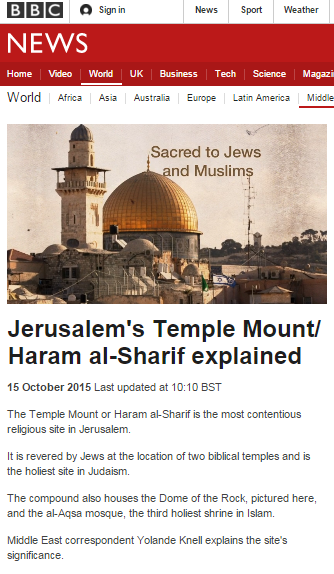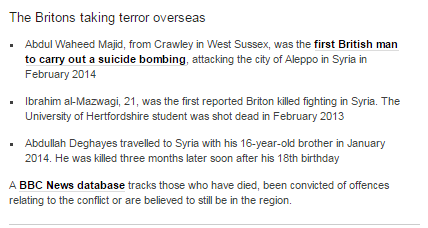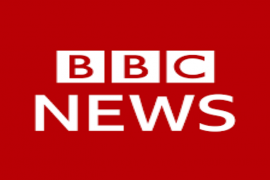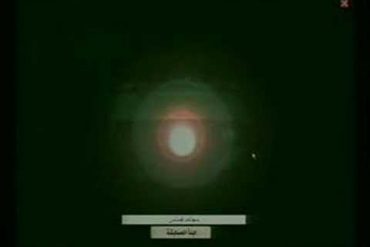Recent visitors to the BBC News website’s Middle East page may have noticed a filmed report dated October 15th by Yolande Knell titled “Jerusalem’s Temple Mount/ Haram al-Sharif explained” which was not only promoted in its own right but additionally included as an embedded video or a link in several recent written articles and also apparently aired on BBC television news programmes. The synopsis to that report claims that:
“Middle East correspondent Yolande Knell explains the site’s significance.”
Obviously it is highly important for audiences to understand that topic if they are to be able to put the Palestinian incitement relating to that site – which has most recently fueled the current wave of terrorism against Israelis and yet remains vastly under-reported by the BBC – into its correct context. However, Knell’s explanatory backgrounder is not fit for that purpose.
“This site in Jerusalem’s Old City is sacred to two religions. Muslims believe it’s where the Prophet Muhammed ascended to heaven. Jews revere it as the site of two biblical temples. It’s known as Haram al Sharif – the Noble Sanctuary – and Temple Mount.”
The site is also of religious significance to Christians, of course, but Knell fails to mention that. Following the usual BBC policy of ignoring history before 1967, she continues:
“For decades it’s been a flash point between Israelis and Palestinians. After the Six Day War in 1967, Israel occupied the Old City and East Jerusalem. But the holy site itself has stayed administered by a Jordanian Waqf – an Islamic trust.”
Tensions relating to Temple Mount were of course evident long before Israel’s creation and incitement based on rumours concerning the site has been a backdrop to anti-Jewish violence for almost a century.
“In September 1928, a small group of Jews erected a “mechitza” (a divider to separate men and women during prayers) for Yom Kippur prayers at the Western Wall. The British forcibly dismantled the divider, but Husseini used this incident as a pretext to incite Muslims. He accused the Jews of attempting to seize Muslim holy sites, including the al Aqsa Mosque. […]
According to Dutch-Canadian journalist Pierre Van Passen who was in Palestine at the time, fabricated pictures of Muslim holy sites in ruins were handed out to Hebron Arabs as they were leaving their mosques on Friday, August 23, 1929. The captions on the pictures claimed that the Dome of the Rock was bombed by the Zionists. That evening, armed Arabs broke into the Yeshiva (Talmudic academy) and murdered the lone student they found. The following day, an enraged Arab mob wielding knives, axes, and iron bars destroyed the Yeshiva and slaughtered the rest of the students there. A delegation of Jewish residents on their way to the police station was lynched by an Arab mob. The mob then proceeded to massacre Hebron’s Jews — both Sephardi and Ashkenazi — who had lived peacefully with their Arab neighbors for years. With only one British officer supervising, the Arab police made no attempt to prevent the massacre.”
Knell refrains from informing BBC audiences of the fact that Temple Mount was under Jordanian occupation for the nineteen years before 1967 and that during that time Jews were denied access to their holy sites – despite the 1949 Armistice Agreement stipulation that there would be “free access to the Holy Places and cultural institutions and use of the cemetery on the Mount of Olives” and supposed UN responsibility for the overseeing of that agreement.
Neither does Knell bother to explain the background to the Waqf’s continued administration of the site. Neglecting to mention that Christians too are prevented from praying at the site, she continues:
“There’s an agreement that Jews may visit but may not pray there. However, some Jews have tried to worship at the Temple Mount – regarded as provocative by Muslims at the site’s al Aqsa Mosque.”
Knell of course does not choose to explore the question of whether, in the 21st century, it is acceptable to deny equal rights for members of all religions or why Muslims should find Jews or Christians at prayer “provocative”. She goes on:
“Many Palestinians are suspicious that some Jewish nationalists want to challenge the Waqf’s jurisdiction. But Benjamin Netanyahu – Israel’s prime minister – says he doesn’t want to change the current arrangements.”
She fails to clarify that, despite the rather more strongly worded commitments to keeping the status quo that her representation suggests which have been issued regularly by the Israeli government, the ‘moderate’ Palestinian Authority and Hamas alike continue to use those baseless ‘suspicions’ and other libels to incite their populations.
Turning to the subject of the current wave of terrorism, Knell closes with more concealment of the very relevant topics of PA incitement and glorification of terrorism:
“On the Palestinian side, some say the latest violence may start a third Intifada – or uprising. But unlike the previous uprisings, most of the recent attacks by Palestinians have been committed by individuals acting on their own. The big question now is whether these attacks will lead to a wider conflict as neither the Israeli government nor the Palestinian Authority seems to be fully in control of the situation.”
The day after this report by Knell was published, it emerged that the Palestinian Authority apparently seeks to further inflame the issue of Jerusalem’s holy sites.
“A new proposal to establish that the Western Wall is part of al-Aqsa Mosque is set to be submitted by the Palestinians to a vote at UNESCO (United Nations Educational, Scientific, and Cultural Organization) next week, Ynet learned Thursday.[…]
Israel has been acting behind the scenes to persuade as many countries as possible to oppose the proposal, or at least to abstain, but it is likely that the proposal will be approved due to the automatic Muslim and Arab majority. Yedioth Ahronoth received a copy of the proposal, which reveals the main points:
1.To declare and confirm that the Western Wall is part of al-Aqsa Mosque, and is called Buraq Plaza (as the Palestinians call the Western Wall). The same applies to the Mughrabi Gate.”
Unsurprisingly, there has been no BBC reporting of that story to date.
The narrative adopted by the BBC frames the Arab-Israeli conflict as being solely about “the occupation” – hence its habitual focus on post-1967 history. Thus, the corporation consistently sells its audiences short by failing to inform them of factors underlying the conflict which were in evidence long before 1967 and in some cases, even before Israel existed.
Incitement based on libels concerning Temple Mount is one of those factors and – as in this report by Yolande Knell – the topic is all too often misrepresented in order to frame it within a narrative which deals only with politics, thereby allowing BBC correspondents to avoid the much more complex and sensitive subject of religious ideology as a factor fueling violence.




